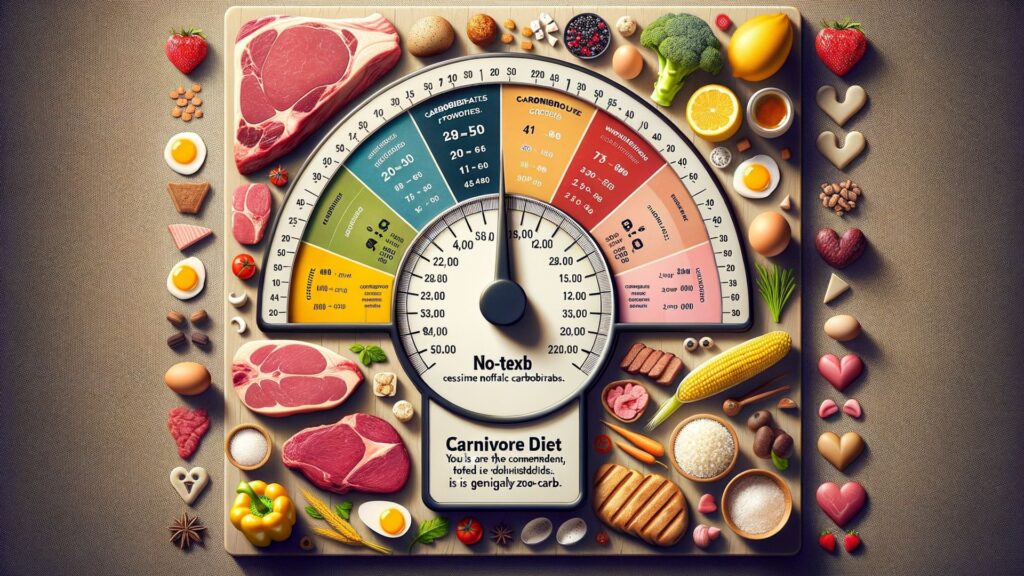Carnivore Diet: Is It Really a Zero Carb Diet?
The carnivore diet has gained significant attention in recent years as a novel approach to nutrition, often touted as a “zero-carb” or “high-protein” diet. Advocates claim it can lead to weight loss, improved mental clarity, and reduced inflammation. However, many question whether it truly lives up to its zero-carb reputation. This article explores the intricacies of the carnivore diet, investigating its principles, food allowances, benefits, and potential downsides, while addressing the overarching question: is the carnivore diet really a zero-carb diet?

What is the Carnivore Diet and How Does It Work?
Understanding the Basics of the Carnivore Diet
The carnivore diet is a dietary regimen that consists exclusively of animal products, effectively excluding all plant-based foods. This low-carbohydrate lifestyle is grounded in the principle that the human body can thrive on a diet rich in protein and fat, primarily sourced from meats, fish, eggs, and certain dairy products. Proponents of the diet argue that it mirrors the natural human eating patterns of our ancestors, who primarily consumed animal products. On this diet, individuals typically consume red meat, poultry, fish, eggs, and in some cases, limited dairy, while entirely eliminating carbohydrates, including fruits, vegetables, grains, and legumes.
How Does the Carnivore Diet Induce Ketosis?
One of the key mechanisms through which the carnivore diet operates is ketosis, a metabolic state that occurs when the body shifts from utilizing carbohydrates as its primary energy source to burning fat for fuel. By adhering strictly to a zero-carb diet, the body’s glycogen stores become depleted, leading to an increase in ketone production from the breakdown of fats. This transition into ketosis is similar to that experienced in a ketogenic diet, where carbohydrate intake is significantly limited. As a result, individuals on the carnivore diet may experience enhanced fat oxidation and a steady energy source derived from fat rather than glucose.
Can You Truly Achieve a Zero-Carb State?
While the carnivore diet is often labeled as a zero-carb diet, it is essential to acknowledge that the concept of “zero carbs” can be somewhat misleading. Although the primary focus is on excluding carbohydrates, certain animal products, particularly dairy, may contain trace amounts of carbohydrates. For instance, while hard cheeses and butter have minimal carb content, they do not represent a complete absence of carbohydrates. Therefore, while followers of the carnivore diet strive to maintain a zero-carb state, achieving absolute zero-carb levels may not be entirely feasible for everyone.
What Foods Can You Eat on the Carnivore Diet?
Animal Products: What’s Allowed?
On the carnivore diet, the primary food groups consist of various animal products, which are encouraged for consumption. This includes a wide array of meats, such as red meat (beef, lamb), poultry (chicken, turkey), and fish (salmon, mackerel). Eggs are also a staple of this diet due to their high protein and fat content. Some followers may choose to include organ meats, which are nutrient-dense and provide essential vitamins and minerals. In terms of dairy, full-fat options like cheese and heavy cream may be consumed but should be monitored for carbohydrate content. The emphasis is on consuming high-quality, unprocessed animal products to maximize nutritional benefits while adhering to the diet’s principles.
Are There Any Foods You Should Avoid?
Adherents of the carnivore diet strictly exclude any foods that contain carbohydrates. This means completely avoiding fruits, vegetables, grains, legumes, nuts, and seeds. These food groups are not only rich in carbohydrates but also contain various phytochemicals and fibers that many believe are beneficial for health. The rationale for excluding these foods is based on the belief that they can lead to inflammation and blood sugar spikes, which proponents argue are detrimental to overall health. As such, individuals following the diet must remain vigilant about their food choices to ensure compliance with its stringent guidelines.
Do You Eat Any Carbs on the Carnivore Diet?
In the context of the carnivore diet, the answer is a resounding no; followers are advised not to eat carbs. The diet’s philosophy revolves around the idea that by eliminating all carbohydrates, individuals can achieve better health outcomes, including weight loss and reduced inflammation. However, it is critical to recognize that while the intention is to maintain a zero-carb lifestyle, trace carbohydrates may inadvertently be consumed through certain animal products. Thus, while the aim is to avoid carbs altogether, complete avoidance can be challenging and may vary from person to person.
What are the Benefits of the Carnivore Diet?
Can the Carnivore Diet Help You Lose Weight?
Many individuals who adopt the carnivore diet report significant weight loss, largely attributed to the high-protein and high-fat nature of the foods consumed. A diet rich in protein can promote satiety, reducing overall calorie intake and curbing cravings for snacks laden with sugar and carbohydrates. Furthermore, the metabolic state of ketosis encourages the body to mobilize stored fat for energy, further facilitating weight loss. However, it is essential to acknowledge that weight loss experiences may vary, and some may find it challenging to adhere to such a restrictive dietary plan over the long term.
How Does It Affect Inflammation and Cholesterol Levels?
Advocates of the carnivore diet often cite its potential anti-inflammatory properties as a significant benefit. By eliminating carbohydrates and focusing on animal products, some individuals experience a reduction in systemic inflammation, which may contribute to improved overall health. Additionally, the impact on cholesterol levels remains a topic of debate. Some studies suggest that a high-fat, low-carb diet can lead to favorable changes in cholesterol profiles, such as increased levels of high-density lipoprotein (HDL) and decreased triglycerides. However, the relationship between saturated fat intake and heart disease remains contentious, and individuals must consult medical advice to understand their unique health circumstances.
What are the Potential Health Benefits of a Zero-Carb Diet?
The potential health benefits of a zero-carb diet extend beyond weight loss and inflammation reduction. Followers of the carnivore diet often report improved mental clarity and focus, likely due to stabilized blood sugar levels and the absence of carbohydrate-induced energy crashes. Additionally, some individuals with type 2 diabetes may find that a low-carbohydrate approach aids in better blood sugar management. Furthermore, the simplicity of the carnivore diet can be appealing for those overwhelmed by the complexities of balanced diet planning, allowing for a straightforward approach to nutrition.
What are the Downsides to the Carnivore Diet?
Are There Risks Associated with a Zero-Carb Diet?
Despite the touted benefits, the carnivore diet is not without its controversies and potential risks. The restrictive nature of this diet can lead to nutritional imbalances, as it excludes various food groups that provide essential vitamins, minerals, and fibers. Critics argue that a balanced diet is crucial for optimal health, and the absence of plant-based foods may result in deficiencies over time. Moreover, the diet’s high saturated fat content raises concerns about its long-term impact on heart health and cholesterol levels, necessitating careful consideration before adopting such a regimen.

How Might It Impact Your Heart Health?
The relationship between a high-saturated fat diet and heart health is a subject of ongoing debate. Some studies suggest that diets high in saturated fat may increase the risk of heart disease by elevating levels of low-density lipoprotein (LDL) cholesterol, often referred to as “bad” cholesterol. While proponents of the carnivore diet argue that the overall impact on heart health can be positive, it is vital for individuals to engage in regular health assessments to monitor their cholesterol levels and overall cardiovascular health. Those with a history of heart disease should approach the carnivore diet with caution and seek medical guidance.
What About the Nutritional Deficiencies?
A primary concern associated with the carnivore diet is the potential for nutritional deficiencies due to the exclusion of various food groups. Essential nutrients such as vitamins C and K, as well as dietary fiber, are predominantly found in fruits and vegetables, which are entirely omitted from the carnivore diet. Additionally, the absence of legumes and whole grains can lead to a lack of important micronutrients. Individuals considering this way of eating must remain cognizant of these risks and may need to explore supplementation to mitigate potential deficiencies.
How to Follow the Carnivore Diet Effectively?
Creating a Carnivore Diet Meal Plan
To effectively follow the carnivore diet, creating a structured meal plan is essential. Individuals should focus on incorporating a variety of animal products to ensure they receive a broad spectrum of nutrients. A typical meal plan might include cuts of red meat for lunch, grilled fish for dinner, and eggs or bacon for breakfast. Additionally, incorporating organ meats can enhance nutritional intake. Planning meals ahead of time can help avoid the temptation to stray from the diet and ensure adherence to its guidelines.

Tips for Transitioning to a Low-Carb Lifestyle
Transitioning to the carnivore diet requires careful planning and mindfulness. Individuals may find it helpful to gradually reduce carbohydrate intake before fully committing to the diet. This can help mitigate potential withdrawal symptoms associated with carbohydrate cravings. Staying hydrated and ensuring adequate salt intake is also crucial, as the body may lose water weight initially, leading to electrolyte imbalances. Education about the diet and its principles can empower individuals to navigate this lifestyle change more effectively.
Common Mistakes to Avoid on the Carnivore Diet
While embarking on the carnivore diet, individuals should be aware of common pitfalls that can hinder their success. One frequent mistake is failing to diversify protein sources, leading to potential nutritional deficiencies. It is also crucial to monitor portion sizes, as consuming excessive amounts of saturated fat without balance can have adverse effects. Lastly, disregarding hydration and electrolyte balance can result in discomfort and health issues. By remaining vigilant and informed, individuals can enhance their chances of successfully following the carnivore diet.
Carnivore Diet Is It Really Zero-Carb Frequently Asked Questions:
Q: Is the carnivore diet truly a zero carb diet?
A: The carnivore diet is often touted as a zero carb diet since it primarily consists of animal products. However, it is essential to note that while it significantly limits carbohydrate intake, it may not be completely devoid of carbs due to trace amounts present in certain animal products.
Q: What foods should I avoid on the carnivore diet?
A: On the carnivore diet, you should avoid all plant-based foods, including fruits, vegetables, grains, and legumes. This restrictive diet focuses exclusively on animal products such as meat, fish, eggs, and some dairy.
Q: How does the carnivore diet work in terms of weight loss?
A: The carnivore diet works by drastically reducing carbohydrate intake, which can lead to weight loss through ketosis, a metabolic state where the body burns fat for fuel instead of carbohydrates. Some followers also report a reduction in calorie intake due to the satiating nature of protein and fat.
Q: Can you eat meat and still be on a low-carbohydrate diet?
A: Yes, the carnivore diet is a type of low-carbohydrate diet that emphasizes eating meat, making it compatible with low-carb principles. Followers of the diet typically consume high amounts of protein and fat while avoiding carbohydrates altogether.
Q: Are there any diet benefits associated with the carnivore diet?
A: Proponents of the carnivore diet claim various diet benefits, including weight loss, improved mental clarity, and reduced inflammation. However, research on the carnivore diet is limited, and it is essential to consider potential nutritional deficiencies from avoiding plant-based foods.
Q: How many carbs are actually consumed in a typical carnivore diet?
A: A typical carnivore diet aims to limit carb intake to nearly zero, usually resulting in very low levels of carbohydrates, often below 5 grams per day. However, trace amounts of carbohydrates may still be present in certain animal products.
Q: Is the carnivore diet considered a fad diet?
A: Many nutritionists classify the carnivore diet as a fad diet due to its restrictive nature and lack of long-term research supporting its safety and effectiveness. It diverges significantly from established dietary recommendations that emphasize a balanced intake of various food groups.
Q: What is the lion diet and how does it relate to the carnivore diet?
A: The lion diet is a more restrictive version of the carnivore diet, focusing solely on the consumption of ruminant meats, such as beef and lamb, along with salt and water. This diet is marketed as an elimination diet to identify food sensitivities, but it shares the same core principles of avoiding all plant-based foods.
Q: Can you still enjoy diet benefits while consuming a carnivore diet?
A: Yes, followers of the carnivore diet often report diet benefits such as weight loss and improved energy levels. However, it is crucial to evaluate potential risks, including nutritional deficiencies and long-term health implications, before committing to such a restrictive diet.




